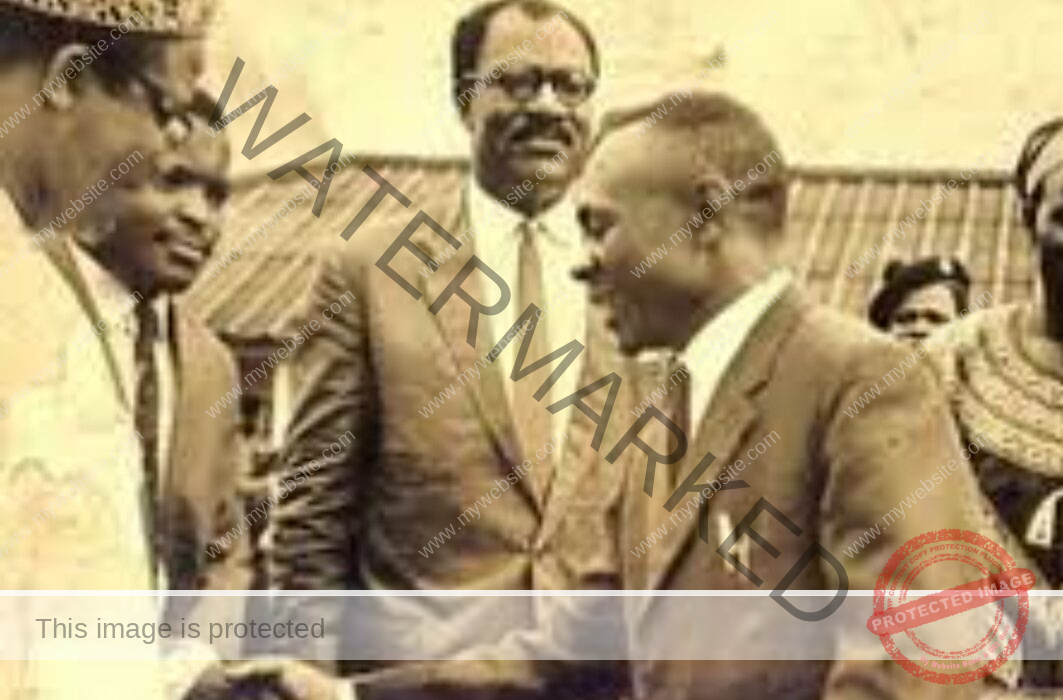John Ngu Foncha, leader of Southern Cameroons, stood alone in Foumban, deprived of genuine British support,despite her obligations as trustee, No treaty was signed. No legal framework existed.
By The Independentist Editorial Desk
The relationship between Britain and the people of the former British Southern Cameroons (Ambazonia) remains one of the most unspoken betrayals of decolonization. While France’s neocolonial ambitions in Central Africa are widely documented, Britain’s role in facilitating Ambazonia’s annexation, silencing democracy, and shielding dictatorship is too often ignored.
From the UN to Foumban – A Broken Promise
In April 1961, the United Nations General Assembly adopted Resolution 1608 (XV), mandating Britain, as the administering authority, to ensure that any union between Southern Cameroons and La République du Cameroun be established through a treaty of union. Instead, France and La République unilaterally amended the French Cameroon constitution, without consultation or preamble, and presented it as a federal structure.
John Ngu Foncha, leader of Southern Cameroons, stood alone in Foumban, deprived of genuine British support. No treaty was signed. No legal framework existed. Britain, despite its obligations as trustee, failed to advise or defend the government it had nurtured. This omission laid the foundation for the present conflict.
Forgotten Sacrifices
The irony is painful. During the Second World War, Southern Cameroonians gave their “widow’s mite” to Britain, raising funds to purchase a Spitfire aircraft that helped turn the tide against Hitler. Many Ambazonian soldiers fought and died under the Commonwealth flag in distant theatres of war.
Yet, at the earliest opportunity, Britain handed their homeland to France — not in gratitude, but in geopolitical expediency.
The 1992 Elections – A Test Betrayed
Three decades later, history repeated itself. In Cameroon’s first multiparty presidential elections of 1992, opposition leader John Fru Ndi of the Social Democratic Front clearly defeated Paul Biya. International observers noted massive irregularities. Ambazonians and other Cameroonians alike expected Britain to speak out.
Instead, silence prevailed. Worse, a British expatriate — reflecting the diplomatic mood of the time — dismissed the democratic victory with the cynical claim: “Biya is more structured and experienced to rule.” Structure, in this context, meant authoritarian control; experience meant entrenching dictatorship.
Even more tellingly, when Fru Ndi himself reached out to British Prime Minister Tony Blair seeking assistance, he was brushed aside. Blair advised him to “go to France.” That was the final signal: Britain would not defend democracy in Cameroon. It had already played Fru Ndi into French hands, conceding its historical responsibility for Southern Cameroons in favour of French dominance.
The “No Economic Interests” Excuse
As if betrayal was not enough, another British expatriate — very likely a political operative — added insult to injury by declaring that Britain had “no economic interests” in Ambazonia.
How convenient. Britain, the very power that plundered Southern Cameroons’ resources, trained its administrators, built its railways, and harvested its cocoa and timber, suddenly claimed disinterest. Yet the oil of Ndian, the fertile soils of Manyu, the cocoa of Mamfe, and the timber of Nkambe—all once flowed into the imperial pipeline.
To say there were “no economic interests” was not neutrality; it was a declaration that without profit, Britain would not defend rights or democracy.
The “Friends of Cameroon” Deception
This same operative would later resurface, attempting to co-opt prominent Ambazonians into a veiled initiative called the Friends of Cameroon. Ostensibly designed to “help stop the war,” it proved to be nothing more than a cover. The effort failed to attract credible Ambazonian voices, and predictably, the so-called Friends of Cameroon achieved nothing.
It was, in truth, a diplomatic smokescreen — orchestrated by the same British Tory circles that once sold Ambazonia to France — designed not to resolve the conflict but to extend the deceit, giving the impression of engagement while avoiding any real confrontation with Biya’s regime.
Contemporary Hypocrisy
Today, the charade continues. During Cameroon’s elections, the British High Commissioner is often photographed at polling stations, exchanging pleasantries in pidgin English with local voters. These photo opportunities project an image of concern. But behind the smiles lies silence: Britain knows fraud is underway, yet avoids substantive criticism.
Diplomatic theatre replaces moral responsibility.
A Record of Silence
Ambazonia’s grievance with Britain is therefore not rhetorical but historical:
In 1961, Britain failed to secure a treaty of union.
At Foumban, Britain abandoned Foncha to face French manipulation alone.
In 1992, Britain looked away when democracy was stolen — and even advised Fru Ndi to seek help in Paris.
In the present crisis, Britain limits itself to platitudes while civilians suffer mass displacement, extrajudicial killings, and war crimes.
And through “initiatives” like the Friends of Cameroon, Britain continues the deception of concern while maintaining the status quo.
The Question Britain Must Answer
The haunting question remains:
What did Ambazonia ever do wrong to Britain?
Our forefathers fought and died in Britain’s wars. They trusted Britain’s promises of fairness and democracy. They gave their money and blood to defend Britain’s freedom against fascism. And yet, Britain betrayed them at the UN, at Foumban, at the ballot box, and in the years of conflict that followed.
Ambazonia does not demand charity. It demands accountability. Britain must acknowledge its role in the current crisis, support international mediation grounded in law, and help repair the damage caused by decades of neglect and complicity.
History shows that every empire that says never eventually yields to freedom: South Africa, Algeria, even America. Ambazonia is no different.
The Independentist Editorial Desk

